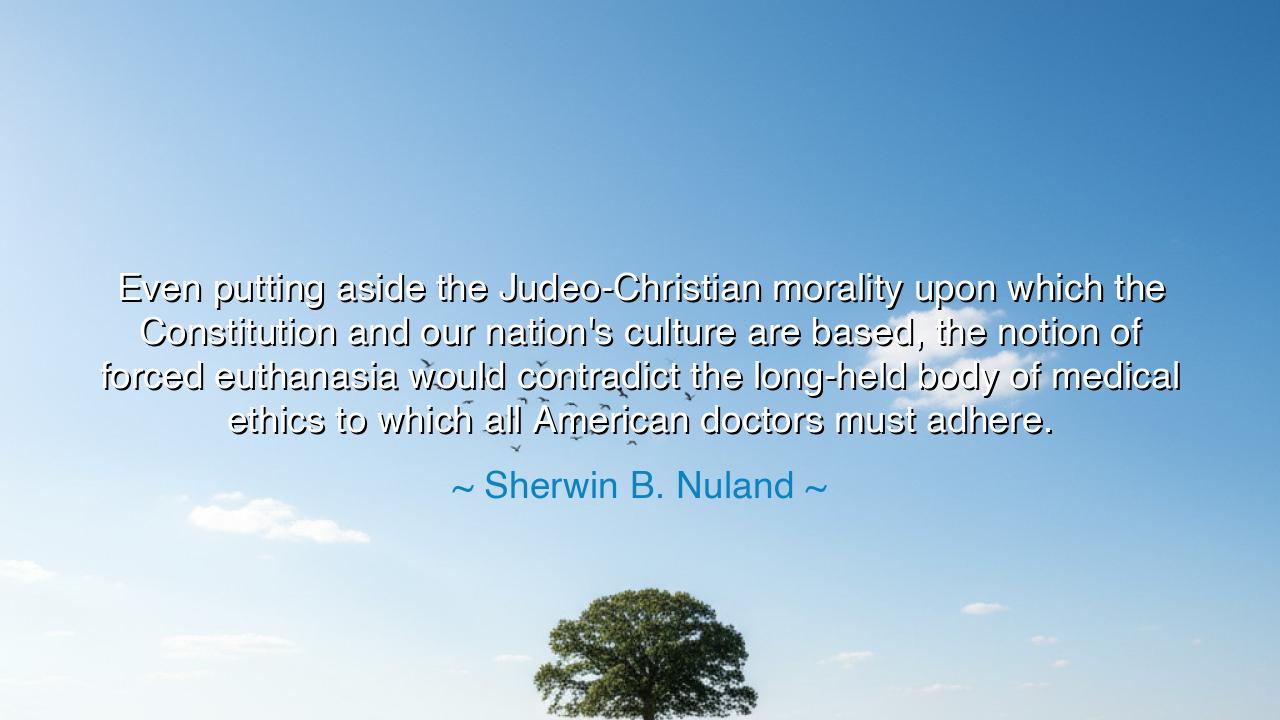
Even putting aside the Judeo-Christian morality upon which the
Even putting aside the Judeo-Christian morality upon which the Constitution and our nation's culture are based, the notion of forced euthanasia would contradict the long-held body of medical ethics to which all American doctors must adhere.






In the words of Sherwin B. Nuland, "Even putting aside the Judeo-Christian morality upon which the Constitution and our nation's culture are based, the notion of forced euthanasia would contradict the long-held body of medical ethics to which all American doctors must adhere." This powerful statement calls attention to the deep moral, legal, and ethical considerations surrounding the issue of euthanasia—a subject that has sparked heated debates for centuries. Nuland highlights the conflict between the moral framework of the nation and the ethical responsibilities that medical professionals are bound by, suggesting that forced euthanasia violates the very principles that guide the medical profession. Nuland's words are a reflection on the fundamental respect for life, rooted in both cultural and medical ethics, and the enduring moral duty of doctors to protect and preserve life.
The ancients understood the value of life and the moral responsibility that came with the power to heal or harm. In Greek philosophy, Plato and Aristotle both discussed the concept of ethics and virtue, with an emphasis on the importance of preserving life and the sanctity of the human soul. For Plato, true justice involved protecting the most vulnerable and ensuring that all actions were in alignment with the greater good. Aristotle furthered this notion by asserting that the role of the physician was to aid the patient's health and well-being, not to take life. This ancient understanding of medical ethics laid the groundwork for the ethical framework that would later influence modern medicine, as seen in the Hippocratic Oath, which doctors still take today, vowing to "do no harm."
Consider the example of Hippocrates, the ancient Greek physician who is often regarded as the father of medicine. He famously declared that medicine's primary goal was to preserve life and that the physician should never intentionally harm the patient. The Hippocratic Oath encapsulates this commitment, emphasizing the sacred duty of medical professionals to act in the best interests of their patients and to avoid practices like euthanasia, which might be considered as harming life. Hippocrates’s belief in the sanctity of life was not just medical but philosophical, rooted in the ethical conviction that each individual life held intrinsic value. Nuland echoes this Hippocratic perspective when he argues that forced euthanasia would be a violation of long-standing medical ethics, which require that doctors respect and preserve life whenever possible.
In more modern history, Florence Nightingale, known as the founder of modern nursing, also emphasized the moral duty of healthcare professionals to prioritize the well-being of the patient. Nightingale believed that healthcare was an act of compassion and care, and she established a legacy in which nurses and doctors were seen as protectors of life. Her ethical stance has shaped the way we view healthcare today, and her principles continue to be foundational in the way medical ethics are taught and practiced. In this light, Nuland's point about forced euthanasia contradicting medical ethics resonates with the longstanding tradition that doctors must first do no harm, and should never become agents of death, even if some argue that it is in the patient’s best interest.
Nuland’s statement also raises a profound issue about the role of culture and morality in shaping our collective understanding of life and death. The Judeo-Christian morality, which has shaped much of Western thought, holds life as sacred and emphasizes the dignity and value of each individual life. These values are deeply embedded in American culture and influence our laws and ethical standards. The Constitution, built upon these moral principles, underscores the inalienable rights of individuals to life, liberty, and the pursuit of happiness—rights that are inherently tied to the preservation of life itself. By referencing this moral framework, Nuland suggests that euthanasia, particularly when forced, runs counter to the nation’s founding ideals and its commitment to human dignity.
The lesson we draw from Nuland’s reflection is one of deep reverence for life and a reminder of the ethical obligations that govern our behavior, especially in the medical field. Just as the ancients viewed the physician as a protector of life, so too must modern doctors continue to uphold these values in an increasingly complex world. The balance between compassion and ethics requires doctors to consider not just the immediate suffering of a patient but the long-term implications of their actions on the moral fabric of society. Nuland urges us to consider the broader consequences of decisions like forced euthanasia, emphasizing that, at its core, it contradicts both the spiritual beliefs that underpin our culture and the ethical foundations of the medical profession.
In our own lives, we can take Nuland’s wisdom to heart by striving to honor life in all its forms and by reflecting on the ethical principles that guide our decisions. Whether we are involved in medicine, law, or daily interactions, we must be mindful of the profound impact our choices have on the dignity of others. Respect for life is not just a matter of legal or medical practice but a moral stance that requires us to approach every decision with the utmost care and compassion. Let us, like the ancients, continue to build a society where the sanctity of life is respected, where compassion and ethics guide our choices, and where we recognize that true justice is found in preserving the inherent value of every human life.






AAdministratorAdministrator
Welcome, honored guests. Please leave a comment, we will respond soon